|
3
Adrian follows the path of Faith and visits a Koran School, a Synagogue and a Christian church. He meets a strange man and gets a cryptic message.
Madrassa Tankyzzija
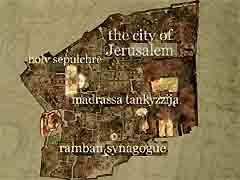 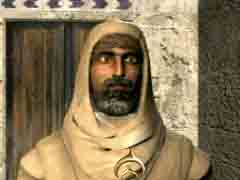 You get the map. Click at Madrassa. You get the map. Click at Madrassa.
When you get there a young man is scrubbing at a word on the wall but it seems impossible to wash it out.
When you get control talk to the man standing in front of you.
It is the Imam Abd Al-Wahid. He tells you that the word faith appeared this morning on the wall and it is impossible to remove. He doesn't want it to look as if a miracle has happened. He does not think it is a good moment to add further troubles to disturb his most sensitive citizens
Adrian thinks it is nothing but a man-made attempt, and wants to have a try at it. The Imam is grateful.
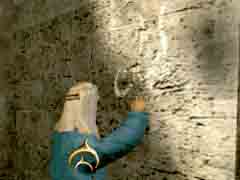
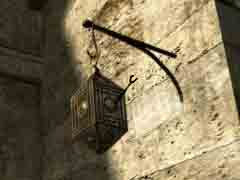 Talk to the boy scrubbing at the wall. Talk to the boy scrubbing at the wall.
He shows you that his rag is only full of the white paint from the wall.
Look at the lantern and the ray of sun light shining through it directly at the word on the wall.
The lantern must be producing the word. Remember that Hayyat had read a treatise on optics.
Get the branch from your inventory and use it at the lantern.
Adrian takes down the lantern and the word vanishes. He explains to the imam that a lens with the word painted on it had been put into the lantern. When the sun rays reached the lens the word on it was projected onto the wall.
Adrian tells the Imam that the governor has given him the task to search for a dangerous man. The Imam has heard of that and offers his help. Hayyat had visited them all at one time or another.
Hayyat wanted to persuade us to abandon our respective religions for one that would reunite Jews, Christians and followers of the Prophet Mohammed. He said that the time had come for the sons of Abraham to finally recognize one another as brothers
The Imam who has heard about Adrian being the translator to the Shavush invites him to enter the Madrassa as it not a religious place
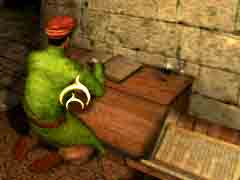
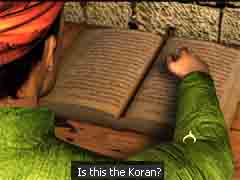 Turn right and go to the men writing books. Click at them and the Imam will tell you what they do. One of them is copying the Koran for the wealthy and for those of modest condition. Turn right and go to the men writing books. Click at them and the Imam will tell you what they do. One of them is copying the Koran for the wealthy and for those of modest condition.
Is not knowledge of the book of Revelations reserved to men of God. All Moslems are men of good and unlike the Christians, Islam is not a church whose members have the privilege of being related to the one.
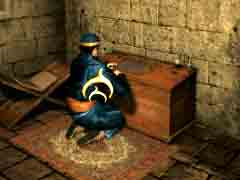
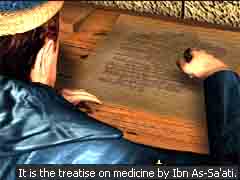 The other one is copying a scientific book. The other one is copying a scientific book.
It is the treatise on medicine by Ibn As-Sa'ati. They copy and study many books of natural sciences and history. Mohammed himself asked his faithful to go and seek knowledge as far as China.
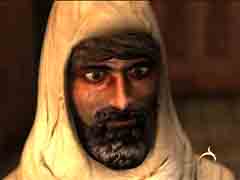 Talk to the Imam about all subjects. Talk to the Imam about all subjects.
He tells you that the Prophet called prayer the apple of the eye of faith and that it is one of the five pillars of Islam.
Moslems must complete five tasks to show their devotion to Allah:
The profession of faith known as Shahada, prayer, charity, fasting and Haij, pilgrimage to Mecca,
These are the acts that distinguish Moslems from the infidel.
The Shahada, "There is no got but God and Mohammed is his Prophet," affirms the oneness of Allah and the prophetic task of Mohammed.
If you pronounce the Shahada with faith, sincerity and ardor you are a Moslem,
The Imam also explains the difference between Jerusalem and Mecca..
Jerusalem is where Mohammed ascended to heaven during the night of the Mi'raj, but Mecca is the holy city of Islam, because that is where the Prophet began his preaching and that is also where the Kaaba stands, the temple built by Abraham and Ishmael on the orders of God.
That is why they turn to face that direction when they pray and that is the city they must travel to at least once in year life for the Haij or pilgrimage.
Adrian thinks it might be dangerous joining the Haij because the roads are not safe as he himself and Ozdemir have discovered recently.
The Imam confirms that there are Bedouin tribes who oppose imperial law by attacking and ransoming pilgrim caravans. It has always been that way but having the great privilege of touching the right hand of Allah is worth the risk.
The right hand of Allah is the Holy Stone of the temple of Kaaba that holds the celestial pact written by God for man. To begin with this stone was whiter than snow, but by touching it the pilgrims have loaded with their sins and it has become darker than the night.
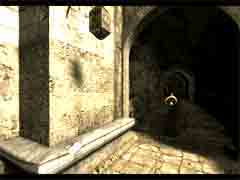 The Imam says that he has to leave. He must begin his ablutions so his body is as pure as his soul when he carries out the gestures of prayer. The Imam says that he has to leave. He must begin his ablutions so his body is as pure as his soul when he carries out the gestures of prayer.
He tells you that you may return if he needs his help again, and that he enjoys teaching strangers the beauties of his faith. But now he has to answer the call of the muezzin and lead the afternoon prayers.
When the Imam has left exit through the brown door to the right, then take the alley to the left and you'll get the map.
Click at the Ramban Synagogue to go there.
Ramban Synagogue
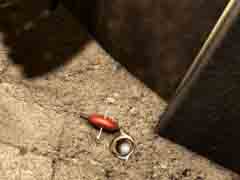
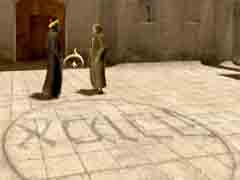 Look down to your right and pick up the sewing-kit. Look down to your right and pick up the sewing-kit.
Go forward and speak to the two rabbis standing close to the circle on the ground.
Adrian asks what worries them and they say it is the word Faith written in the sand. They say they have been abused by Moslems lately and are afraid that there will soon see a much more disagreeable word if they let it continue. They can't remove it because it is the Sabbath.
The Sabbath is the last day of the week and they must stop all domestic activities to devote their attention to praising their Creator. Therefore they cannot brush the floors or do any sort of labour.
Adrian offers to do the job for them but the rabbis refuse. They do not follow laws only to incite non-believers to break them on their behalf. God must brush the words away with his breath, but they can't ask favours of the Almighty for such futile matters.
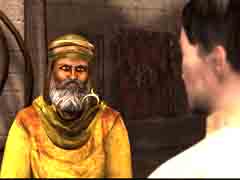 Turn right and go to the man who stands alone in front of this stall. Turn right and go to the man who stands alone in front of this stall.
Talk to him about the writing. He says that if it were up to him, the word would have been scrubbed away a long tine ago. The Moslems aggravate them so much and he does not want them to disturb them on the Sabbath too. Some Moslems see Dhimmis as victim to attack when they wish but the governor is fair. He has made several judgements in their favour in matters that have set them against the Moslems. The problem comes mainly from certain cruel and frustrated individuals.
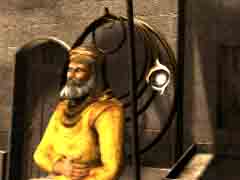 Adrian tells him the that the Rabbis want God to blow on the sand to erase the Sign. Adrian tells him the that the Rabbis want God to blow on the sand to erase the Sign.
It is not possible, says the craftsman, because although the wind is blowing hard it only blows up against the roof tops.
Adrian asks he craftsman to lend him some arches from his casks and also the canvas of his canopy.
The craftsman wants to know why and Adrian says that he cannot command the wind but he might trap it.
Take the arches behind the craftsman.
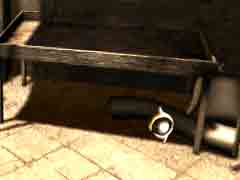
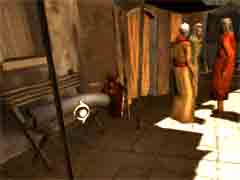 Take the hessian (fabric) lying under the bench. Take the hessian (fabric) lying under the bench.
Go to the bench to the left of the two men at the other side of the yard, Take the second hessian from the bench.
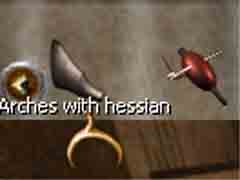
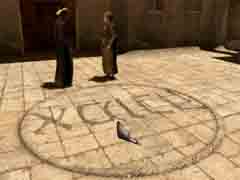 In inventory combine first one hessian with the arches, then combine the second hessian with the result. At last combine the sewing-kit with the arches with hessian and you'll get a wind-trap. In inventory combine first one hessian with the arches, then combine the second hessian with the result. At last combine the sewing-kit with the arches with hessian and you'll get a wind-trap.
Go to the circle with the word and use the wind-trap on it.
Adrian places the wind trap, the wind is caught and blows away the written words.
Talk to the Rabbis.
When Adrian says God has answered their prayers the rabbi will not comment on the incredible pretension of his words but he thanks God for having inspired one of his sons.
Talk to the rabbi again and ask all the questions.
About Hayyat they say that he was a moralizer criticizing their most holy customs.Regarding the dagger they do not accept the idea that the father of the Hebrews was thus taken hostage by the Moslems.Adrian asks if Abraham was not the father of them all.
They reply that Abraham was the father of Isaac, grandfather of Jacob, great-grandfather of Joseph whose descendents was the father of Moses but he was not the father of the servants of Mohammed. They state that any relic of Abraham's belongs to the Chosen People who alone were guided by his wisdom and no one else.
The Rabbi says that it was the Alliance between Yahweh and the Hebrews on their departure from Egypt that made them a people of priests destined to carry the message of the one God to all nations. He thinks it is a privilege that lays many duties upon them but few rights, That is what they cannot forget on pain of failing in their task.
The Hebrews didn't settle in Egypt by their own will, it was quite the contrary.
Thirteen centuries before the Christians' Messiah, Palestine was the theatre for a long and bloody war between the Egyptians and the Hittites. When the enemies eventually signed a peace treaty the territory where the Hebrews lived was handed over to Egypt. But Moses assembled the people and freed them from slavery, by bringing them here to the Promised Land, the land of Canaan, as is told in the book of Exodus.
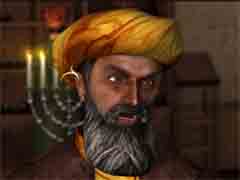 Ask to enter the Synagogue. Ask to enter the Synagogue.
The Rabbi takes you there and tells you it is the oldest Synagogue in Jerusalem. It is called Ramban, which is a deformation of a man's name Nahman. This man as an interesting story.
Rabbi Nahman lived in Spain at the end of the 12:th century of the Christian era. A Jewish apostate challenged him to prove the superiority of the Jewish faith over all others. After four days and four nights of verbal sparring the King of Aragon declared Rabbi Nahman the winner. But the victory gained him many enemies and the old man had to go into exile. His feet led him to Jerusalem., where only two Jews lived at the time, two brothers, among three thousand Ger Tochav, Christians and Moslems. With them he built this Synagogue and revived the faith of his forefathers in Holy Ground.
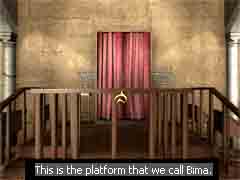 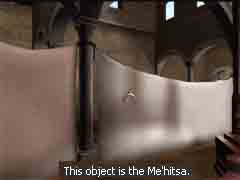 An apostate is one who abandons his faith either as a result of personal choice or threat, as happened only a few decades ago for Hebrews living in Spain and Portugal, who had to choose between conversion and exile or death. An apostate is one who abandons his faith either as a result of personal choice or threat, as happened only a few decades ago for Hebrews living in Spain and Portugal, who had to choose between conversion and exile or death.
Ger Tochav is what the Jews calls Christians and Moslems as they conform to the seven laws that the Almighty gave to Noah to be passed on to all humanity.
Akoums, on the other hand, is the name the Jews gives to those who do not recognize this precepts, the pagans who adore stars and planets.
The synagogue is in fact only an external envelope built to protect the holy arch, Haron Hakodesh, that in turn covers the parchment rolls on which the Sefer Torah is written, the Law of Moses.
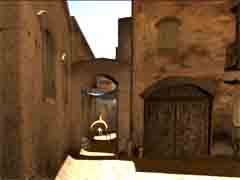 Three times a week and every Holy Day, the rabbi holds a public reading of the Torah from a platform called Rima. In the Hebrew religion the prayer has great value. It is not only asking for something it is first and foremost a way of showing faith in the Eternal Lord. For the man who carries Yahweh in his heart every breath is thanks to the creator for the gift of life. The Me'hitsa is used to separate men and women during prayer. Three times a week and every Holy Day, the rabbi holds a public reading of the Torah from a platform called Rima. In the Hebrew religion the prayer has great value. It is not only asking for something it is first and foremost a way of showing faith in the Eternal Lord. For the man who carries Yahweh in his heart every breath is thanks to the creator for the gift of life. The Me'hitsa is used to separate men and women during prayer.
Turn left and leave by the alley where you came. After a few steps you get the map. Click at the Holy Sepulchre to go there.
The Holy Sepulche
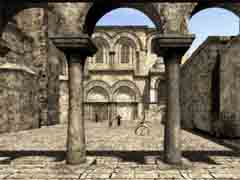
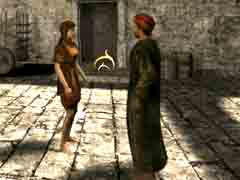 Go forward and turn left. Go forward again and turn right. Go forward and turn left. Go forward again and turn right.
Talk to the two paupers.
They say they are hungry and thought that because the men were so generous with the sign on the ground they might get something too.

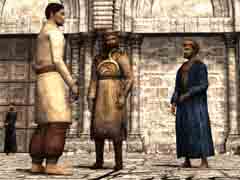 Go to the men standing at the circle and talk to them. Go on talking until you have asked all questions Go to the men standing at the circle and talk to them. Go on talking until you have asked all questions
Adrian Asks what is disturbing them and learns that it is the sign.
The man says that it would appear that by throwing a coin and making a prayer a wish can be granted. At least it would do no harm trying.
They say it is a miracle. People has been praying there all morning throwing coins
Adrian thinks it would be more Christian to give the coins to the poor, but the men fear that their wishes would not be granted if the coins disappear. Anyway when night falls the beggars would take the coins anyway and everybody would be happy.
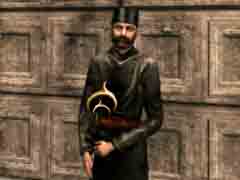 When Adrian remarks that they are encouraging the poor to steal out of pure superstition they get angry and tells him to talk to the Archimandrite Palmede, he is a church superior, and if they were doing something wrong he sure would have stopped them. And if God had wanted them to give the money to the poor he would have written Charity and not Faith. When Adrian remarks that they are encouraging the poor to steal out of pure superstition they get angry and tells him to talk to the Archimandrite Palmede, he is a church superior, and if they were doing something wrong he sure would have stopped them. And if God had wanted them to give the money to the poor he would have written Charity and not Faith.
Go to the archimandrite and talk to him. An Archimandrite in the Orthodox church is the same as the Pope in the Catholic church.
When you ask if he really thinks the sign comes from God he replies that only a wise would know.
Talk to him about the poor.
When Adrian says he would gladly give his own small coins, but they are far less valuable, the Archimandrite answers that there is a way satisfying your appetite for justice and respecting the wishes of everyone.
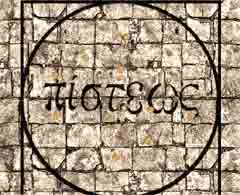
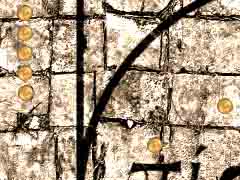 Go to the circle and click inside it. Go to the circle and click inside it.
Adrian throws a coin and the men are yelling Sacrilege. The archimandrite asks Adrian what he is doing and Adrian replies that he is making a wish that the poor may eat so that they are no longer hungry, and the more coins he throws the more wishes are granted.
Throw your coins one at a time. Click each of the five coins at one of the gold coins in the circle, Your coin is changed into a gold coin and placed outside the circle- When you have five gold coin the archimandrite tells the story of Lazarus and the Rich man. He says you have proved yourself worthy and invites you to enter the church.
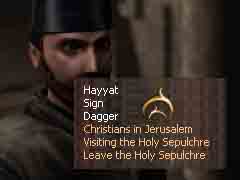 "I tell you my sun," he says, "that weather one is a shepherd of souls or sheep the most important quality is patience." "I tell you my sun," he says, "that weather one is a shepherd of souls or sheep the most important quality is patience."
"The shepherd can from time to time give his sheep a little kick up the backside," answers Adrian,
You have both heart and spirit," says Palamede, " could I do you a favour in return."
Ask him all questions available.
Hayyat has often come to visit him. He is a man with both culture and idealism and such men have often difficulty being accepted.
About the sign he says that it was obviously man made. If the man was inspired by God he can not say.
Abraham's dagger has become the subject of a great debate between the millets and the Ottoman leadership.
We Christians claim the dagger can only be kept in the Holy Sepulchre.
Do not be offended of what I say but Abraham is a great Prophet for the three religions of the book.
True, and the Holy Sepulchre is the only religious place where all three can some and admire it.
The mosques are closed and the synagogue is too small. It is a matter of justice and good sense.
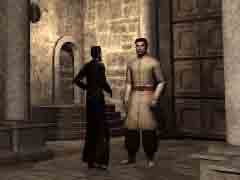 How is the Christian community in Jerusalem spread out. How is the Christian community in Jerusalem spread out.
We are in the same town where Christ preached and where he knew the passion
And unfortunately even here his faithful have split up into different families.
The Franciscans of Latin rite occupy the monastery of mount Zion which is now beyond the city walls.
The Armenians who are Monophysites have always come on pilgrimages to Jerusalem. Some stayed here permanently. They occupy the southwestern district around St. James Cathedral,
Finally we the Orthodox Christians keep this holy place for all.
What do you mean by Latin Rite, Father
The rite of the Catholics, the Christians who submit to the authority of the Pope in Rome
Why is the Orthodox rite different from the Latin Rite.
That is a difficult question, Let us say the Catholics have chosen to unconditionally follow the Popes of Rome while we Orthodox remain faithful to our local churches.
What does monophysite mean?
The Armenians the Egyptian Coptics and the Syrian Jacobites believe that only divine nature was in Jesus Christ, but their doctrine was condemned during a religious council in the middle of the 5:th century. The council claimed that the son of Mary had a dual nature both human and divine.
You see there are many ways to live through the Christian faith. Jesus himself said: "In my fathers house, there are many mansions."
Why are the eastern and western churches so separated,
For theologians of the east the Holy Ghost is subordinate to the sun and to the father,
If he is subordinate to the sun then the pope is his earthly representative.
In 1054 the eastern and western churches finally split over this detail.
We however believe that each believer carries a part of the Holy Ghost in him.
Adrian than has a guided tour through the church.
Click at the priest to leave the church.
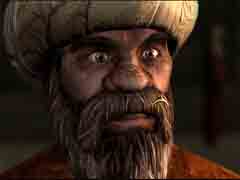 Outside the door a man is waiting for you. He says; " Congratulations, I saw how you stood up to those superstitious babblings:" Outside the door a man is waiting for you. He says; " Congratulations, I saw how you stood up to those superstitious babblings:"
Talk to the man . Use all subjects given.
On the question if he is sent by Ibrahim to protect Adrian the answer is; "What else? Nothing can be hidden from a mind as perceptive as yours."
Then he asks Adrian what lessons he has learned to day. Adrian thinks that he is one of Ibrahim's man answers: "I have seen the believer confronting his faith, the Almighty, the One God who is love and forgiveness for all His sons. I have heard him revered by three names.
I have seen the holy houses built in his name. I have spoken with the guards of this houses and each one has told me wise and beautiful things for man."
Three voices serving the one and same Word. Do you think that one day, they will speak as one."
Adrian is surprised Ibrahim has a man like this in his service but the man now says that he is above all in God's service. He wants to know if Adrian has learned something more.
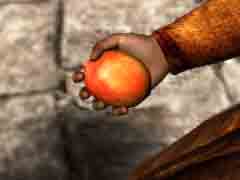 Adrian Answers: "I have seen men interpret signs too quickly and find what will serve them even more rapidly" Adrian Answers: "I have seen men interpret signs too quickly and find what will serve them even more rapidly"
"Superstition follows pride and obeys it as a father," says the man.
Adrian recognizes this as word from Socrates and says the spy evidently also is a philosopher but the man doesn't like the word spy , he prefers Guardian Angel.
He is still not satisfied and wants to know if Adrian learned something more.
"I have seen the strength and power that faith gives to a believer," says Adrian,
"And what power," answers the man. "Touch the invisible, see that reality is not a matter of appearance. A truth that faith teaches and which could be useful principle in all circumstances in our lives. Tell me has it not happened often that, having searches for something for a long time you realize it was under your nose from the very beginning?"
"Very often," says Adrian, "what do you think is the blindfold that covers our eyes?"
"Vanitas, vanitatis. All is vanity," says the man, "but now I must leave you. I hope my paltry disguise has been of some use. Who could guess that even a fruit would contain such flavour."
He has a fruit in his hand. Click at it and you will get a date in the inventory.
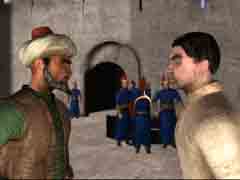 He vanishes and you are taken to meet Ozdemir outside the garrison. Talk to him about everything. He vanishes and you are taken to meet Ozdemir outside the garrison. Talk to him about everything.
Ozdemir want to know the news.
Adrian tells him about the word Faith being written in front of the three places marked on the map. It looks like the man wants to be found.
Ozdemir wonders what could possibly motivate the man to put himself in such danger, and Adrian answers "Vanity". Then they walk together to see the governor.
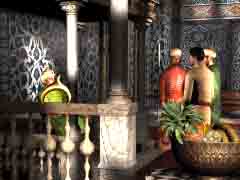
The governor also wants to know the news. Adrian tells him that just a few hours after his escape Hayyat wrote the word Faith in front of the three places he has indicated on his map. Of course that led towards him but by which path?.
The governor wants him to summarize.
Talk to the governor and choose all subjects.
Adrian says that Hayyat made them take the path of Faith by leading them towards religious places. Because Hayyat works with analogies he is now going yo lead them towards the path of Hope. What is the common point he wants us to find this time.
About The one God, the governor thinks that was the lesson of the triptych. Religious places are to difficult to indicate such symbols.
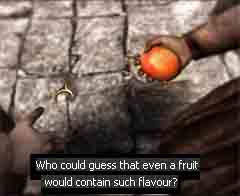
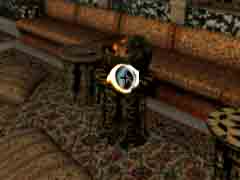 Prayer? Adrian gets an idea. The fruit he got from the man must mean something. Prayer? Adrian gets an idea. The fruit he got from the man must mean something.
Turn right Go towards the door at the back wall. Turn left and look at the table with the fruit bowl.
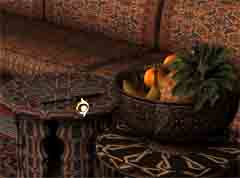
 Click at the knife to take it. Click at the knife to take it.
Use the knife on the date in inventory and Adrian discovers a message. They all read the message.
The governor asks who gave him the fruit and Adrian answers it was Ibrahim's man. Ibrahim denies that and then at last Adrian understands that the man was Hayyat.
When you get the map choose the library.
|